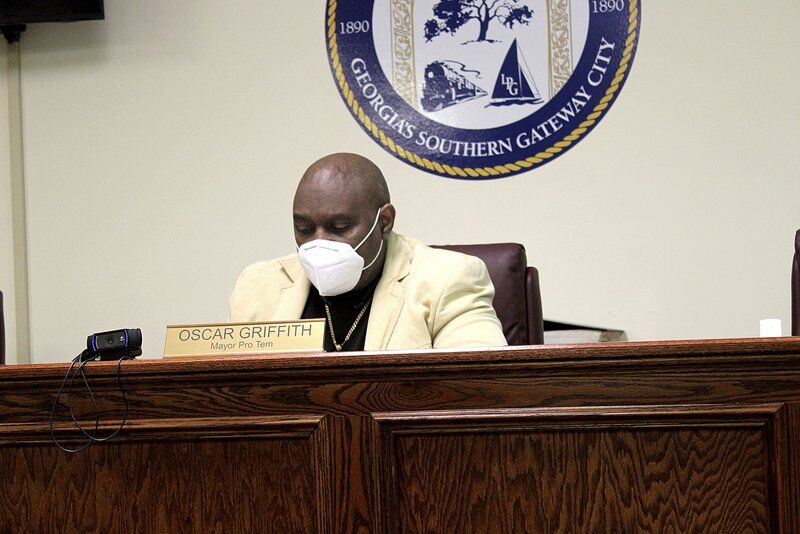Lake Park weighs disbanding police department
Published 3:11 pm Wednesday, February 9, 2022

- Terry Richards | The Valdosta Daily TimesOscar Griffith, mayor pro tem of Lake Park, presides over his first council meeting as acting mayor.
LAKE PARK — Lake Park City Council weighed disbanding the city police department during its meeting Tuesday. Review of the proposal drew opposition and came to a head when the mayor ordered a resident speaker removed from council chambers.
The topic first surfaced in the January City Council meeting when a town resident urged disbanding the police department for financial reasons.
At the meeting Tuesday, Police Chief David Kinney was questioned closely by Council member June Yeomans about the staffing of the police department, hours of patrol operations and the number of service calls the department receives.
Then, during the “citizens to be heard” segment of the meeting, several people stood up to question council about rumors the police department may close.
Ralph Romero asked if the mayor and council had “calculations or plans” to disband the department.
Mayor Pro Tem Oscar Griffith said, “Nothing has been discussed about disbanding anything.”
Romero opposes disbanding the force, saying without local police, response times for county deputies to respond to calls would be “basically useless. … We’re talking about 20-minute response times.”
As it stands, Lake Park’s police force — three full-time officers and four part-time officers — generally operates from 7 a.m.-7 p.m., with the Lowndes County Sheriff’s Office providing coverage at night.
When Romero asked if disbanding the police department is possible in the future, Griffith said, “It could be.”
“Why?” Romero asked.
“It would save the city a lot of money,” Yeomans said.
When asked where any money saved by such a closure would go, the mayor said, “We haven’t got to that point yet.”
Romero said he would “raise Cain” if he found out City Council was trying to disband the police department; the mayor said it sounded as if he was threatening the council, which Romero denied.
About 15 minutes after Romero started speaking, Griffith asked Chief Kinney to escort him out of council chambers; Romero said he was leaving anyway.
One resident said he is in favor of abolishing the police, saying he had a bad interaction with them and had started a Facebook page for like-minded people.
Another resident, Patricia Brown, asked each council member directly if they planned to get rid of the police or fire departments; each member said “no.”
Carl Taylor, a former city council member and former Georgia State Patrol post commander, told council he had seen “a draft copy of a contract that the city has entertained looking at so there is proof that the city is entertaining abolishing part or all” of the police department.
The day after the meeting, Lowndes County Sheriff Ashley Paulk said Griffith and Yeomans had reached out to him about taking over law enforcement for Lake Park full-time, and he quoted them a price of about $30,000.
The sheriff’s office already has a similar deal with the town of Dasher but Paulk said Lake Park would be more expensive as it had more businesses to cover.
Even if the sheriff’s office took over law enforcement, Lake Park would still need a city marshal to handle matters such as evictions because the sheriff’s office doesn’t handle civil issues, the sheriff said.
Staffing wouldn’t be a problem as the department not only has deputies posted to operational “zones” but also has “roving deputies” who can respond as needed, as well as detectives and officers in other departments who can help out, Paulk said.
One thing that could be lost if Lake Park switched to deputy coverage would be personal contact, he said.
Kinney — an 11-year veteran of the force — said that the police department can get out in the community and get to know people. He contrasted this with his time working with the police in larger Charlotte, N.C., where the police force was “reactive,” spending most of its time dispatched to handle emergencies.
Property crime rates in Lake Park are lower than in surrounding areas because “high-visibility” police patrols discourage criminals, the chief said.
“We’ve gotten guns and drugs off the street,” he said.
The police department’s budget is almost entirely paid for by fines and forfeitures, he said.
Terry Richards is senior reporter at The Valdosta Daily Times.




